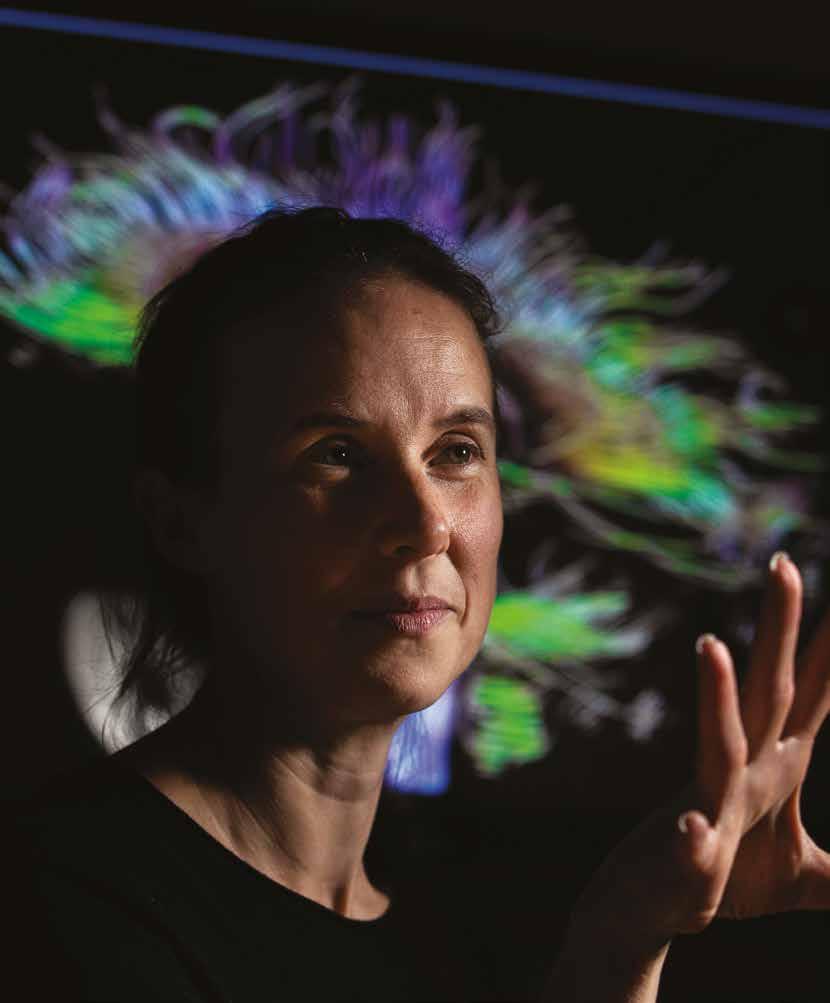
3 minute read
MORE THAN A HANGOVER

Dr Catherine Shippen, Consultant Clinical Psychologist ad Mersey Care's Brain Injury Rehabilitation Unit
MORE THAN A HANGOVER
It’s a common sight in A&E – the clearly intoxicated patient, who is assessed, treated and discharged, yet comes back again and again.
But there’s more to this scenario than meets the eye. One in three people who drink to excess have alcohol related brain damage. It impairs their memory and decision making, and stops them sticking to programmes that could help them abstain. Family relationships break down when their loved one seemingly ignores all help.

Jenna Simons, Occupational Therapist
Mersey Care’s Brain Injury Rehabilitation Unit’s specialist team assesses and treats complex patients on a sustained intensive programme to help them understand and manage their difficulties.
The challenge facing acute staff is to work out what the person needs during an often short hospital stay. While many go home, some need more support.
Jenna Simons is an occupational therapist with Liverpool University Hospitals NHS Foundation Trust.
“These patients go through detoxifications, medications and discharge to community alcohol programmes.
But because the brain injury affects their memory and cognitive capacity to keep up the treatment, they don’t keep up with appointments and lapse from programmes. They begin drinking again and end up back in A&E and the cycle continues.
“Because they appear normal there’s sometimes a perception that the drinking is a lifestyle choice, that the person is taking up valuable NHS time, yet doing little to help themselves. They become stigmatised,excluded and exploited. The reality is that they don’t have insight intotheir situation.”
Both teams try to establish the triggers for someone’s drinking so they can find ways to meet not just their medical needs, but link with agencies to address housing, benefits and other aspects of their lifethat may have contributed to the problem.

Consultant Liaison Psychiatrist, Dr Cecil Kullu
They work together to make other services more aware of the impact of an alcohol related brain injury and to highlight the need for more specialist community services. They also work closely with families to explain the reason for the person’s behaviour.
Dr Catherine Shippen, consultant clinical psychologist at the Brain Injury Centre says by the time they are diagnosed both the person and those around them are often at crisis point. It’s a challenge for staff as recovery can be slow, but they’re determined that people should have the chance to reach their full potential.
“Families are angry and frustrated; they’ve tried everything, yet the person appears unwilling to change. Explaining the impact of the brain injury, particularly memory loss and lack of insight, can help.”
Referral numbers are rising – and the team is seeing a big increase in people as young as 30. Dr Shippen calls for more awareness of alcohol related brain injuries.
“We talk a lot about liver damage from alcohol abuse, but few people are aware that drinking heavily for a long time can cause a brain injury.”
• Alcohol Change has a fact sheet: Alcohol related brain damage: what is it?
Consultant liaison psychiatrist Dr Cecil Kullu says the condition can dramatically reduce life expectancy. “Alcohol affects all the organs. Because the brain damage prevents people seeking help, they often go onto develop serious alcohol related problems such as strokes and cancers.It’s very sad”.
He says bringing together different teams with complementary skills is changing the way these patients are supported.
“For example, having the expertise of an occupational therapist to identify problems in the way someone functions that might indicate a brain injury is invaluable. It means people get the right treatment and the best chance.”
SIGNS AND SYMPTOMS
Cognitive and memory problems include:
• memory loss
• difficulty in familiar tasks
• problems processing new information
• poor choices and decision making
• depression and irritability
• poor judgement and loss of inhibition
• problems with language, remembering words or the names of friends and family, or problems like forgetting the end of a sentence halfway through
• erratic behaviour and mood swings
• difficulty concentrating.
Physical problems include:
• damage to the liver, stomach and pancreas
• pins and needles or numbness in arms and legs
• slow wide stumbling gait
• poor temperature control, muscle weakness and disturbed sleep patterns.
For more information go to www.alcoholchange.co.uk or NHS.uk









